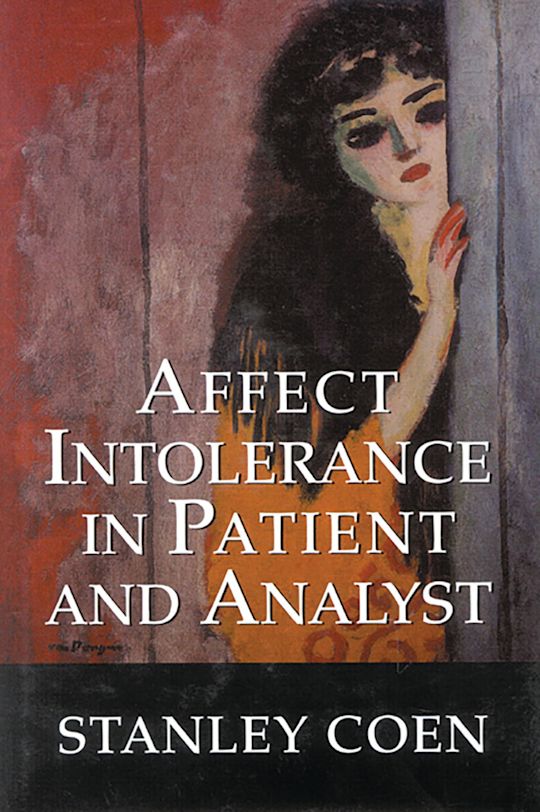- Home
- ACADEMIC
- Psychology
- Psychology - Other
- Affect Intolerance in Patient and Analyst
Affect Intolerance in Patient and Analyst
This product is usually dispatched within 1 week
- Delivery and returns info
-
Free US delivery on orders $35 or over
You must sign in to add this item to your wishlist. Please sign in or create an account
Description
The ability of psychotherapists to tolerate their own feelings in the clinical situation determines how their patients experience and tolerate their own intense-and often distressing-affect.
Dr. Stanley J. Coen draws on his own struggles with the most difficult and challenging patients in his practice, and finds that affect intolerance, in both patient and therapist, can be mitigated and understood when therapists broaden their emotional range, enabling them to engage in emotionally richer interactions with the patient.
The more of their own feelings and wishes that clinicians can take responsibility for, the more they can tolerate, contain, and eventually interpret what patients find emotionally unbearable. Dr. Coen describes, in detail, how he works with difficult patients, trying to engage them as deeply and fully as both they and he can tolerate.
Coen focuses on the pragmatic use of affect tolerance in the clinical situation. Real change through treatment requires mobilization of intense feeling, including hate and love. Therapists, too, must contend with their own emotional inhibitions and stalemates, and he suggests collaborative ways to help them. He encourages therapists to broaden their perspectives, consult with colleagues, listen to others, write about their difficulties, work in peer supervision, and perhaps even go back to treatment themselves. He counsels them to study one another's difficult cases in a spirit of collegiality to learn what is most effective for patients.
Coen shares his own experiences in troublesome clinical situations to help other therapists identify similar difficulties. He shows how all therapists can be prepared to catch their own vulnerabilities and discomforts with their patients' passions, and how they can then subject their feelings to self-scrutiny. By seeking to understand and confront their struggles with the feelings that their patients arouse, therapists can more fully help their patients work out their conflicts and to expand their emotional depth.
A
Table of Contents
Chapter 2 Barriers to Love between Patient and Therapist
Chapter 3 How to Help Patients and Therapists Bear the Unbearable
Chapter 4 Managing Rage and Hate in the Treatment Setting
Part 5 What is the Therapist's Role in Helping the Patient Develop Affect Intolerance?
Chapter 6 Dangerous Need and Desire
Chapter 7 Perverse Defenses in Neurotic Patients
Chapter 8 The Wish to Regress in Patient and Therapist
Chapter 9 How Much Does the Therapist at Work Need to Feel?
Part 10 Helping Therapist Affect Tolerance through Taking and Writing About our Work
Chapter 11 Discussing Colleagues' Therapeutic Work
Chapter 12 Why We Need to Write Openly about Our Clinical Cases
Chapter 13 Applications of Child Development Research to Adult Treatment
Chapter 14 The Pleasures and Pitfalls of Interpretation
Product details
| Published | Jan 31 2003 |
|---|---|
| Format | Hardback |
| Edition | 1st |
| Extent | 320 |
| ISBN | 9780765703644 |
| Imprint | Jason Aronson, Inc. |
| Dimensions | 9 x 6 inches |
| Publisher | Bloomsbury Publishing |
About the contributors
Reviews
-
Stanley J. Coen, in this passionate and scholarly volume, has undertaken to guide psychoanalysts toward more candid, effective and affective modes of interaction with their patients and communication with each other. Through numerous case examples, Dr. Coen helps us to understand the many ways in which therapists hide, disguise, or misidentify their emotions in a psychotherapeutic situation, and he points to the great therapeutic benefit of an increased awareness. Dr. Coen's emphasis on affect as centrally guiding our therapeutic efforts will be illuminating to every psychotherapist. It is a pleasure to encounter such clarity and directness in psychoanalytic writing. Dr. Coen's openness and honesty provides a guide for all of us.
Arnold M. Cooper
-
Stanley J. Coen has given us a remarkable book. He has provided us with a close look at his work with very difficult patients. We are with him in his consulting room observing his struggle to manage his patients' feelings and his own. Dr. Coen's accounts of each therapeutic encounter provides the psychotherapist reader with fresh insights and new approaches that can be applied to their clinical work. Dr. Coen should also be commended for avoiding the polemical, inter-theoretical controversies that often distance us from our primary aim-helping our patients to help themselves and achieve their aims. It is a book that will be found most often chairside in the therapist's office rather than on the shelf.
Arnold D. Richards M.D., editor, Journal of the American Psychoanalytic Assocation
-
This book is an excellent account of Dr. Coen's work with patients who have great difficulty tolerating the affect that is aroused by the usual analytic interventions. This book provides both extremely interesting clinical material and a solid understanding of the importance of increasing our tolerance of our own affect and that of our colleagues and patients.
Psychologist-Psychoanalyst
-
Writing with a striking degree of candor and earnestness, Stanley J. Coen engages us in a dialogue about matters that lie at the heart of our clinical enterprise. He helps us examine and re-examine the barriers to love between patient and therapist, the anxious avoidance of hate between the two parties, the temptations of desire, the vulnerability of need, the labyrinth of regression, the false haven of intellectualization, and the benefit of communicating with colleagues and writing about cases. He advocates passionate involvement in the clinical dyad while maintaining an interpersonal and intrapsychic ambiance of tolerance and containment. The resulting development of powerful affects, regardless of their social acceptability and potentially threatening nature, becomes the ground for interventions that are authentic, credible, and ultimately mutative. Unabashedly given to enhancing our clinical acumen, Coen's book has the wisdom that results from devotion and beauty that accompanies boldness.
Salman Akhtar, MD, professor of psychiatry, Jefferson Medical College; training and supervising analyst, Psychoanalytic Center of Philadelphia



































